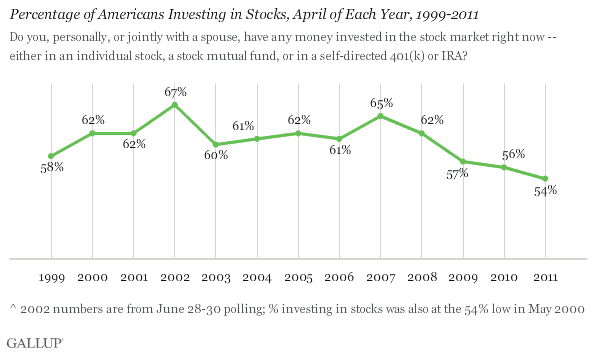
1. Be aware of your emotions before leaving.
"Investing success doesn't depend on your intellect. You must have the temperament to resist the urges that can cause others to be in trouble. Warren Buffett is chairman of Berkshire Hathaway. He is an accomplished and wealthy investor who serves as an example for investors who are looking for longer-term, long-term, market-beating and wealth building yields.
Before we begin we'll give you a advice. We advise against investing more than 10 percent of your portfolio in individual stocks. The remainder should be invested in low-cost index mutual funds. The money you'll need in the next five years should not be put into stocks at all. Buffett is talking about investors who trust their heads, and not their guts, drive their investment decisions. Indeed, overactivity in trading triggered by emotions is one of the most frequently occurring ways that investors can harm their own returns on portfolios.
2. Do not pick ticker symbols, but companies
It's easy to forget that in the alphabet pool of stock quotes that crawl at the bottom of each CNBC broadcast is a real business. Stock picking shouldn't become an abstract concept. You're part-owner of the business if you purchase shares of its stock.
"Remember that purchasing shares in the stock of a company makes you a partial owner of the business."
You'll find an overwhelming amount of information as you screen potential business partners. However, it's easier to zero to the relevant information by wearing the "business buyer" costume. You need to understand how the business operates, where it is in the industry and who its competition is, what its long-term prospects are, and whether or not it adds value to your existing businesses.

3. Don't panic during moments of panic
Investors are sometimes enticed to alter their relationship with stocks. Making decisions in the midst of a crisis can lead to classic investing mistakes: selling low and purchasing high. Journaling can be helpful here. Write down what makes every stock in your portfolio worthy of a commitment and, while your head is clear, the reasons that justify a breakup. You can take this as an example:
What I bought: Tell me your favorite aspects of the company and the opportunities you see for the future. What are your expectations of the company? What are the most important indicators? What milestones will you use for evaluating the company's performance? Review the possible dangers, and decide the ones that could be game-changers or indications of an unexpected setback.
What would cause me to sell? The section in your journal should contain an investment prenup. It should explain what you would do to make the shares more sellable. It isn't a good idea for stock prices to fluctuate in the short-term. However, we'd like to address fundamental changes to the company, which could impact the company's ability to grow over time. Examples include: A major customer goes away, the CEO changes direction or a potential competitor is discovered or your investment thesis does not materialize within a reasonable amount of period of.
4. It is possible to gradually increase your position
Timing, not timing is the ultimate power of an investor. Stocks are purchased by investors who hope to be rewarding with price appreciation and dividends. over time or even for decades. You can buy slowly over time, and you don't need to hurry. Three ways to reduce the risk of price volatility.
Dollar-cost Average: Although it sounds complicated however, it's actually not the case. Dollar-cost averaging is the process of investing a set amount over a period of time. For instance, each week or month. This money could be used to buy more shares when the price of the stock decreases and less shares when it rises. But, in the end, it's equal to the price you pay. Online brokerages offer the option for investors to establish an automated investing system.
Buy in Thirds: Similar to dollar cost Averaging, "buying In Thirds" will help you avoid the negative experience of getting bad outcomes right away. Divide the amount that you wish to invest by 3, and then select three points to buy shares. They could be scheduled to be scheduled at regular intervals (e.g. monthly, quarterly) or in accordance with corporate performance or other events. For instance, you may buy shares before a new product comes out and put the third of your money into play if it's a hit -- or divert the remaining money elsewhere if it's not.
Buy "the Basket" Are you unsure of which companies will last long in a particular field? You can buy every one of them! Buy a variety of stocks to ease the stress of finding "the one". You will not lose out on any stock that is able to pass the test of your analysis. You can also use the gains from that winner as a hedge against losses. This strategy will also allow you to identify which firm is "the one to beat" and allow you to double your stake.

5. Beware of trading that is too active.
Monitoring your stock once per quarter -- for instance, when you receive quarterly reports is enough. It's difficult to not keep an eye on the board. It can be dangerous when you react too quickly to unexpected events, and to be focused on the value of the company more than share price.
Find out the reasons behind the sudden price change of a stock. Does your stock suffer collateral damage because of the market reacting to an event that is not related or is it the one who was hit? Are there any changes in the business of your company? Is it something that meaningfully affects your long-term outlook?
It's rare that the quick-witted noise (blaring headlines, and price fluctuations) has any bearing on the long-term performance of a carefully selected business. How investors respond to noisy events is the most important thing. Here's where that rational voice from a calmer time -- your investing journal -could serve as an example of how to stay out during the inevitable downs and ups that come with investing in stocks.